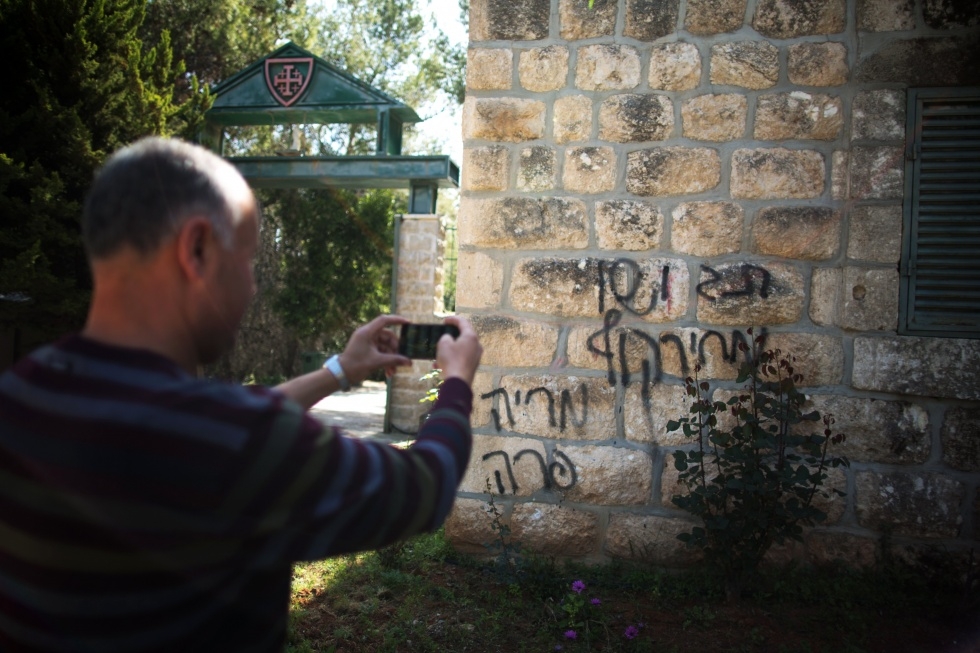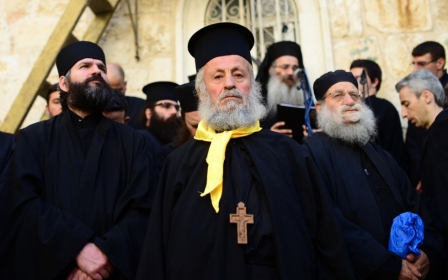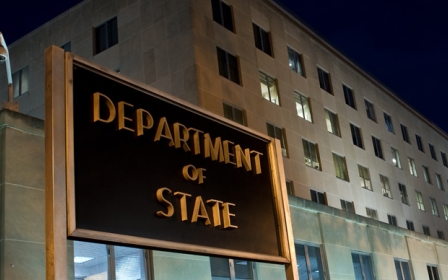Minister: Israel needs 'iron fist' against anti-Arab hate crime

Israel must tackle anti-Arab hate crime with an "iron fist," a top minister said on Monday as police confirmed arresting seven minors over racist graffiti and spitting at a priest.
The Israeli authorities are facing mounting pressure to rein in a spiralling wave of so-called "price tag" hate crimes by Jewish extremists targeting Arab Israelis and Palestinians, with new racist vandalism attacks being reported on an almost daily basis.
Commentators have also warned that a continued failure to tackle the phenomenon could end up triggering a violent backlash.
"We must strive to be a state . . . that fights to the end against racism, against violence and against xenophobia," Defense Minister Moshe Yaalon said at a memorial day ceremony for fallen soldiers and those killed in terror attacks.
"A state that must fight with an iron fist against the terror which is wrongly called 'price tag' - an ugly phenomenon which has no connection to Jewish values and morals, and whose aim is to harm Arabs only because they are Arabs," he said.
New MEE newsletter: Jerusalem Dispatch
Sign up to get the latest insights and analysis on Israel-Palestine, alongside Turkey Unpacked and other MEE newsletters
His remarks came as Israeli police said they had arrested seven Jewish minors over racist acts and vandalism.
Four are suspected of spraying racist graffiti at a building site by an Arab village near Jerusalem, and another three were picked up for spitting at a priest by Jerusalem's Old City and for carrying flags scrawled with the words "revenge" and "price tag".
Price tag is the euphemism for nationally-motivated hate crimes by Jewish extremists which predominantly target Palestinian property, but have also included attacks on other non-Jews as well as left-wing Israelis or the security forces.
Such attacks, which tend to involve vandalism and trademark racist graffiti in Hebrew, began sporadically in the West Bank several years ago with settlers seeking to exact a "price" for state moves against illegal settlement outposts.
But since then, they have spread into Israel. Despite hundreds of arrests, hardly anyone has been prosecuted, raising questions about the government's willingness to tackle the problem.
"Burning mosques and churches, desecrating holy books and cemeteries and damaging Arabs' cars have become common phenomena on both sides of the Green Line," said an editorial in Haaretz newspaper by Hussein Abu Hussein, a lawyer who founded the rights group Adalah.
During the first and second Palestinian uprisings (1987-1993 and 2000-2005), a single stone thrown at an Israeli bus would see Israel's Shin Bet security services and police investigators acting rapidly to round up, arrest and prosecute those involved, often within hours, he wrote.
"The Arab public -- particularly the youth -- suspiciously wonders on social media why law enforcement's resourcefulness and speed disappear when it comes to Jewish terror. Why doesn't the Shin Bet get involved? Is it because the victims are Arab?" he wrote.
Ongoing indifference by the Israel authorities could spark "a religious war" with people taking the law into their own hands to protect their holy places, and could easily end in violence if one of the perpetrators were to be caught in the act of desecrating a mosque, he warned.
Last week, the US State Department for the first time included mention of price tag attacks in its global report on terror, saying such incidents were "largely unprosecuted".
On Sunday, Justice Minister Tzipi Livni said she would back the idea of defining such acts as "terrorism".
Middle East Eye delivers independent and unrivalled coverage and analysis of the Middle East, North Africa and beyond. To learn more about republishing this content and the associated fees, please fill out this form. More about MEE can be found here.



